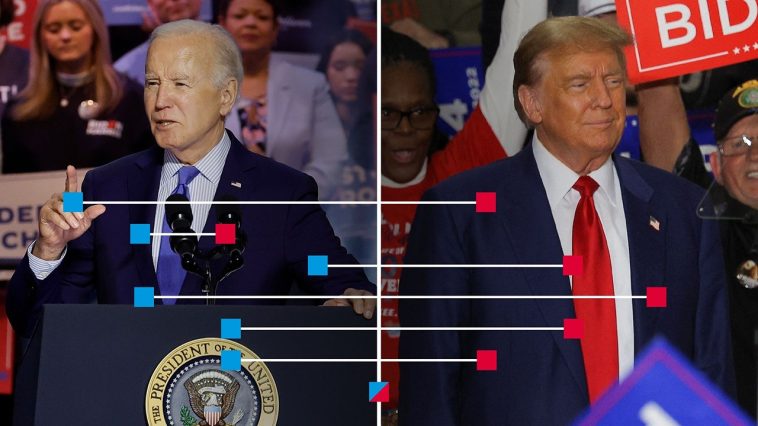As the first term of President Biden winds down, the center stage is filled with his hallmark legislations that have funneled billions of dollars to the swing states. Despite the immense financial influx via the bipartisan Infrastructure Law of 2021, the CHIPS Act, and the Inflation Reduction Act (IRA), there’s a profound skepticism whether these funds will hold any sway in the electoral outcomes this November.
Promotional campaigns supporting Biden’s legislative agenda run rampant in swing states, illustrating the various projects and funding sources created. Nonetheless, state and national political analysts, in conversation with the Daily Caller News Foundation, express doubts about these benefits drastically influencing the political landscape of key states such as Arizona, Michigan, and Pennsylvania.
Estimates suggest that these three legislative behemoths have channeled a whopping $15.4 billion towards public programs in green energy, infrastructure, and semiconductor chip manufacturing in the state of Arizona. These stats are from Invest.gov, the official hub for tracking the administration’s progress. Along with these public funds, Biden’s team also highlights the drawing of a staggering $121 billion of private sector investment to the state, thanks to their legislative work.
Biden’s landmark legislation has also brought significant monetary benefits to Pennsylvania. The state is the recipient of $16.7 billion in public funds, invested in green energy, infrastructure, and semiconductor initiatives. Michigan shares similar benefits with a total allocation of $12.5 billion for similar projects. In both these crucial rust belt states, the administration proudly announces a combined private sector investment of $32 billion, funneled towards green energy, manufacturing, semiconductor production, and more.
The political spotlight is firmly on Pennsylvania, which witnessed a flip from Trump’s favor in 2016 to Biden’s side in the 2020 election cycle. The state’s future voting pattern is a keen area of interest for any hopeful eyeing victory in 2024. Current polling averages from RealClearPolitics point at Trump leading Biden by a narrow margin of 2%. Moreover, in the upcoming Senate race this November, incumbent Democrat Sen. Bob Casey will seek re-election, adding another layer of political stakes for Pennsylvania.
Sen. Bob Casey seemingly holds a delicate 4.8% lead over Republican contender Dave McCormick, based on RealClearPolitics polling data. However, the Biden administration’s decision in January to halt approvals for new liquefied natural gas (LNG) export terminals may swing the pendulum. Pennsylvania’s significant contribution to natural gas production at the national level – 20% of U.S. natural gas in 2022 hails from the Keystone State as per U.S. Energy Information Administration – underscores the weight this move holds.
Experts argue that the LNG pause might cost the Democrats a Senate seat, given Pennsylvania’s unique demographic profile. The fallout of this policy also threatens to negatively impact Biden, since the natural gas industry employs numerous Pennsylvanians. As of March, economic concerns led the list of issues for more than 35% of voters in Pennsylvania, followed by crime and immigration, according to an Emerson College Polling and The Hill survey.
Michigan is another crucial state that switched its preference from Trump in 2016 to Biden in 2020. RealClearPolitics poll data reveals a slight lead for Trump, ahead by a mere 0.8%. Michigan’s identity as the heart of America’s auto industry intertwines with Biden’s climate change agenda, especially the focus on boosting electric vehicle (EV) production and usage in the coming decade.
The IRA and the Infrastructure Law include subsidies particularly aimed at aiding the transition to EVs, along with encouraging American manufacturing and the adoption of other green technologies. However, the adoption of this green sustainable model has sparked concerns among members of the United Auto Workers, who fear potential job losses, leading to a strike in 2023.
Promoting investments related to EVs and green energy, particularly in a state housing numerous blue-collar voters with populist inclinations, might be more counterproductive than beneficial, posits Jason Cabel Roe, a Michigan-based GOP consultant. Nonetheless, with limited options at their disposal, Biden and his campaigners appear to be sticking to this strategy. Roe further speculates that immigration could become a defining theme in the upcoming Michigan polls.
Arizona, another state that swung in favor of Biden in the 2020 election from a Trump victory in 2016, finds itself in a unique position. Recent poll numbers from RealClearPolitics indicate a 5.2% lead for Trump. Arizona’s unique conditions stem from its status as the site of the CHIPS Act’s major outcomes, while its geographical location on the Mexican border may amplify immigration issues unlike other swing states.
According to the Center for the Future of Arizona, immigration concerns overshadow all other issues for Arizona voters. Notably, the state has witnessed the establishment of multi-billion dollar semiconductor production facilities from tech giants like Intel and TSMC, brought in by the incentives of the CHIPS Act.
Despite the economic boost from these new tech establishments, local voters are more likely to be swayed by concerns over the economy and border security, infers Barrett Marson, a Republican strategist based in Arizona. The influence of these new facilities seems less potent in convincing the electorate, compared to other pressing issues.
The Biden campaign has made no official comments on these speculations. However, given the investments, legislative decisions, and the complex dynamics of swing states, the upcoming elections promise a fascinating political spectacle.


